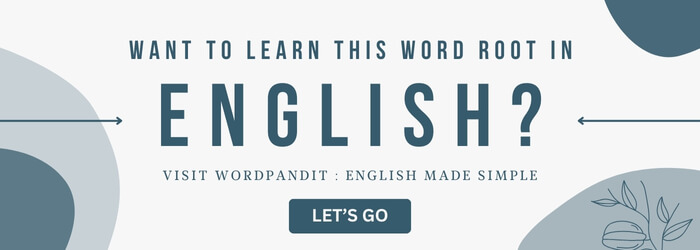Verb: Unlocking the Power of Words and Expression
Verb: Unlocking the Power of Words and Expression
Discover the versatility and impact of the root "verb," stemming from the Latin verbum, meaning "word" (शब्द). Words like "verbal" (वाचिक) aur "proverb" (लोकोक्ति) dikhate hain ki kaise yeh root communication, literature, aur beyond mein ek foundation ban gaya hai.

Table of Contents
- Introduction: The Essence of "Verb"
- Etymology and Historical Journey
- Mnemonic: Remembering "Verb" Easily
- Common "Verb"-Related Terms
- "Verb" Through Time
- "Verb" in Specialized Fields
- Illustrative Story: "Verb" in Action
- Cultural Significance of "Verb"
- The "Verb" Family Tree
- FAQs About the "Verb" Root
- Test Your Knowledge: "Verb" Mastery Quiz
- Conclusion: The Living Legacy of "Verb"
Introduction: The Essence of "Verb"
The root "Verb" signifies the power of words in conveying thoughts, actions, and ideas. From everyday speech to the complexity of poetry, "Verb" plays a pivotal role in human communication.

Etymology and Historical Journey
The root "Verb" comes from the Latin word verbum, meaning "word." Ancient Roman grammarians considered verbs the cornerstone of a sentence, as they describe actions and states. Over time, this root influenced different languages and created terms related to verbal expression and communication.
Mnemonic: Remembering "Verb" Easily
Imagine a glowing book with "VERB" written on it, and words dancing off its pages, expressing emotions and stories.
Mnemonic Device: "VERB gives words life—bringing action and meaning!"
Common "Verb"-Related Terms
- 1. Verbal (वर्बल): Related to words or spoken communication.
Example: "Her verbal skills impressed everyone during the debate." - 2. Proverb (प्रोवर्ब) A short saying that expresses truth or wisdom.
Example: "The proverb 'Actions speak louder than words' is universally recognized." - 3. Verbiage (वर्बिएज): The excessive use of words.
Example: "The contract’s dense verbiage made it difficult to understand." - 4. Verbosity (वर्बोसिटी): The quality of using too many words.
Example: "His verbosity often obscured his main point." - 5. Adverb (एडवर्ब): A word that modifies verbs, adjectives, and other adverbs.
Example: "In 'She sang beautifully,' the word 'beautifully' is an adverb modifying 'sang'."
"Verb" Through Time
- • Latin Roots (लैटिन की जड़ें): The importance of verbal communication was emphasized in education and rhetoric.
- • Medieval Era (मध्यकाल): Proverbs became popular for conveying moral lessons concisely.
- • Modern Usage (आधुनिक उपयोग): The use of "Verb" expanded into linguistics, computer programming, and advertising.
"Verb" in Specialized Fields
- Linguistics:
Verbalization: The process of expressing thoughts in words.
Example: "Children develop verbalization skills from an early age." - Technology:
Voice Recognition: Verbal commands play a crucial role in AI systems.
Example: "Natural language processors analyze verbal inputs." - Education:
Verbal Reasoning: A cognitive skill assessed in standardized tests.
Example: "Verbal reasoning evaluates logic and language comprehension."
Illustrative Story: "Verb" in Action
Sophia was a proverb collector, fascinated by timeless wisdom. One day, during a community debate, her verbal eloquence was put to the test. She used the proverb "A stitch in time saves nine" to argue for early action in environmental conservation. Her carefully chosen words inspired the audience, proving the power of the "Verb" root in effective communication.
Cultural Significance of "Verb"
The "Verb" root has shaped cultures worldwide, from oral traditions to education and legal texts. It remains at the heart of how societies communicate, preserve knowledge, and express creativity.

The "Verb" Family Tree
- Verbum (Latin: Word)
- Verbose: Using too many words.
- Verbalize: To express something in words.
- Lex (Latin: Word, Law)
- Lexicon: A dictionary or a set of words.
- Log (Greek: Word, Reason)
- Dialogue: An exchange of ideas or conversation.

FAQs About the "Verb" Word Root
Q: "Verb" root ka kya matlab hai?
A: "Verb" root Latin shabd verbum se aaya hai, jiska matlab hai "word" (शब्द). Iska use language, communication, aur expression ke liye hota hai, chahe woh spoken ho ya written.
Q: Verb aur Proverb mein kya difference hai?
A:
• Verb (क्रिया): Ek grammatical term hai jo action (जैसे "run") ya state of being (जैसे "is") ko describe karta hai.
• Proverb (लोकोक्ति): Ek short saying hai jo universal truth ya practical advice express karta hai (जैसे "Honesty is the best policy").
Example: "The proverb 'Actions speak louder than words' reflects the power of verbs in real life."
Q: Kya "verb" sirf grammar mein use hota hai?
A: Nahi, "verb" grammar ke alawa verbal communication (जैसे "verbalize") aur dense language (जैसे "verbiage") ko bhi represent karta hai.
Q: Verbiage ka kya matlab hai, aur yeh criticize kyun hota hai?
A:
• Verbiage (शब्दों की अधिकता): Shabdon ka excessive ya unnecessary use, jo communication ko unclear bana deta hai.
• Criticism: Yeh criticize isliye hota hai kyunki audience confuse ho sakti hai aur main message dilute ho jata hai.
Example: "Legal contracts often contain excessive verbiage, making them hard to understand."
Q: Verbal aur Oral communication mein kya farq hai?
A:
• Verbal communication (शब्द-आधारित): Ismein spoken aur written dono forms include hote hain.
• Oral communication (मौखिक): Sirf spoken words ko refer karta hai, written language ko exclude karta hai.
Example: "A written contract is a form of verbal communication, but a speech is purely oral."
Test Your Knowledge: "Verb" Mastery Quiz
1. "Verb" root ka kya matlab hai?
2. Ek proverb ka example kaunsa hai?
3. Excessive word use ko kya kehte hain?
4. Ek adverb kya modify karta hai?
5. "Verbal reasoning" kya hai?
Conclusion: The Living Legacy of "Verb"
The root "Verb" highlights the power of words in shaping thought, culture, and expression. Whether spoken or written, words help us communicate ideas, share knowledge, and connect with others.








